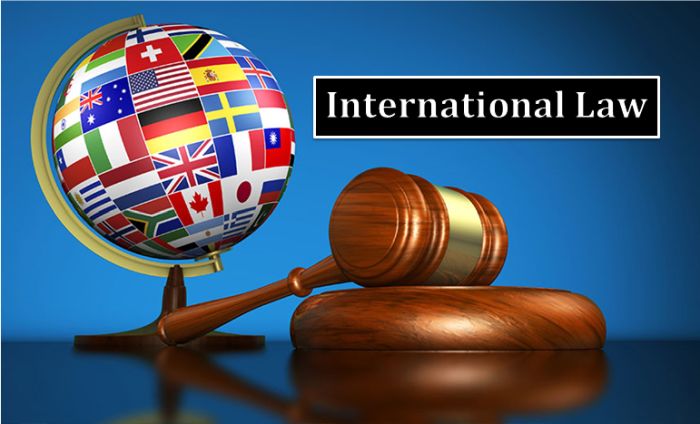




In a globalized world, the role of international law in ensuring justice and promoting stability is crucial. Globalization has transformed international social relations and called for a shift in the social theory of international law towards a global society of persons [08c4a17f]. Public International Law has evolved to accommodate increased participation and communication, which have become sources of power [08c4a17f]. International law serves as a means to resolve conflicts and promote global fairness, with the protection of human rights being a crucial aspect [08c4a17f]. It also plays a role in protecting the high seas, outer space, and the environment [08c4a17f]. Treaties and agreements in international law facilitate global cooperation in areas such as nuclear nonproliferation, disarmament, trade liberalization, and public health [08c4a17f]. However, globalization presents both opportunities and challenges for international law, as it impacts the themes, purposes, and core of the field, making regulation more complex [08c4a17f].
Globalization has led to increased competition for resources on a global scale, contributing to a widening wealth gap between rich and poor countries [08c4a17f]. The article highlights the importance of global justice academics in broadening the scope of international relations theory by shifting the focus to humans on a planetary scale [08c4a17f].
The article 'Rule of Law: Vapid or still relevant?' by Martin van Staden explores the relevance of the Rule of Law in a jurisprudence of liberty [227000c2]. Van Staden defines the Rule of Law as the legal institution that regulates or attempts to eliminate state arbitrariness. He outlines the requirements of the Rule of Law, including that the law must be knowable, accessible, unambiguous, certain, and reasonable. He discusses the difficulty of determining what is arbitrary and suggests that basic justice encompasses a short list of things that everyone can reasonably agree on. He concludes that society, if it observes the requirements of the Rule of Law, would be left with a framework of basic justice that indirectly serves liberty [227000c2].
The article 'The economic consequences of legal behavior' by Kaushik Basu discusses how societal attitudes towards the law can significantly affect a country's economic performance [9cd57d37]. Basu highlights the importance of a system that emphasizes the spirit of the law, as it gives individuals discretionary power, leading to potential misuse or abuse. He cites Japan as an example of a country that has transformed from a low-income economy to one of the world's richest countries, partly due to its law-abiding culture. Adherence to the letter of the law fosters better organization, which fuels economic growth and overall development. On the other hand, the New York model, where individuals are given leeway to interpret the law, has its merits in encouraging creativity and enhancing efficiency. Basu suggests that attempting to bring about a normative transition from adherence to the letter of the law to realizing its spirit could backfire, producing cacophony. He emphasizes the role of economists and legal scholars in facilitating such a shift while mitigating potential risks [9cd57d37].
The article 'LA Public Defenders: A Look at Their Role and Impact' by Random Lengths News discusses the role and impact of LA Public Defenders [c2a0ef51]. It highlights the challenges faced by public defenders in providing legal representation to indigent clients. The article mentions that LA Public Defenders handle a large caseload, with each attorney handling an average of 400 cases at a time. It also mentions that public defenders often face limited resources and inadequate funding, which can affect the quality of representation. The article emphasizes the importance of public defenders in ensuring access to justice for all individuals, regardless of their financial status. It mentions that public defenders play a crucial role in the criminal justice system by advocating for their clients' rights and providing a defense against criminal charges. The article also discusses the impact of public defenders on reducing incarceration rates and promoting fair outcomes in the criminal justice system. It highlights the need for increased support and resources for public defenders to effectively carry out their duties. The article concludes by emphasizing the importance of recognizing the value of public defenders and their contribution to the justice system.
The article 'From local to global: optimism remains the challenge for justice' by Longford Leader discusses the challenges faced by the justice system at both the local and global levels [cfb970ef]. It highlights a case in the Longford District Court where a defendant fails to appear and is fined for a minor public order matter. The article then explores the global justice system, including the International Court of Justice (ICJ), the International Criminal Court (ICC), and the Permanent Court of Arbitration (PCA). It mentions the slow pace of cases at the ICC and the criticism it has faced for bias and Eurocentrism. The article concludes by discussing the launch of plans for an International Anti-Corruption Court in The Hague and the importance of global cooperation in achieving justice.
The World Day for International Justice is observed every year on July 17 to promote international criminal justice and fight against impunity [cf9dcd01]. It commemorates the adoption of the Rome Statute on July 17, 1998, which established the International Criminal Court (ICC). The ICC is the first permanent international court that prosecutes individuals accused of genocide, crimes against humanity, war crimes, and crimes of aggression. The day raises awareness about the importance of holding individuals accountable for grave crimes and highlights the rights of victims and survivors. Ways to participate include educating oneself about international criminal justice, raising awareness, participating in events, and advocating for justice and accountability [cf9dcd01].